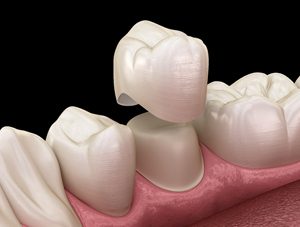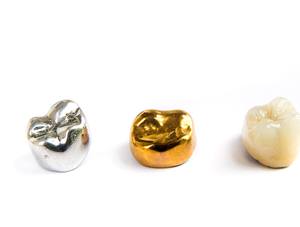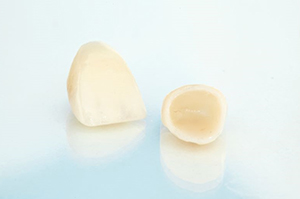Dental Crowns – Newington, CT
Improved Function and Appearance for Damaged Teeth

Dental crowns have helped generations of patients to enjoy renewed dental function and enhanced smile aesthetics. These restorations can play an important role in preserving and strengthening weakened teeth. Here at Family Dental Practice of Newington, we are proud to offer this remarkable treatment to patients in our community. On this page, you will learn more about what crowns are, how to tell if you need one, and the different types of crowns available.
What Is a Dental Crown? How Do I Know if I Need One?

A dental crown is a custom-made restoration that fits over the entire visible portion of the tooth — that is to say, everything above the gum line. The main purpose of crowns is to protect a weakened or damaged tooth from further harm. You may need one if:
- One of your teeth has recently undergone root canal therapy
- You have cracked tooth syndrome
- A tooth has a cavity that is too large to be addressed by a filling, inlay, or onlay
- A tooth has become worn down due to bruxism (teeth grinding)
- You wish to improve the appearance of misshapen or discolored tooth
- You have an old crown that feels loose, or you wish to replace an old crown with something that is more natural-looking
What Are the Different Types of Crowns?

Crowns can be constructed out of various materials, including:
Ceramic
Ceramic crowns, sometimes called porcelain crowns, are popular because they so closely resemble natural tooth enamel. They can even be shade-matched to blend in seamlessly with the surrounding dentition. We typically recommend this type of restoration for patients who require a crown on a tooth that is easily visible when they smile.
Porcelain Fused to Metal
Porcelain fused to metal (PFM) crowns have a metal base that is entirely covered by porcelain. These crowns look like natural tooth enamel, although in some cases, it is possible to discern the metal beneath the crown, particularly when you look at the gum line. PFM crowns are very durable and can work well on virtually any tooth.
Gold
Gold crowns are extremely fracture-resistant, which makes them ideal for back teeth. They are also gentle on nearby teeth, and they are thin enough that they usually require minimal preparation of the tooth that supports them. Their biggest disadvantage is that they look nothing like natural enamel.
Benefits of Crowns
Some significant benefits of dental crowns include:
- They can help to save a damaged tooth from extraction
- A well-made crown can contribute to a comfortable, functional bite
- In the majority of cases, dental insurance covers at least a portion of the cost of dental crowns
- Depending on what it is made of, a crown can last for a decade or longer with proper care
- The process of placing a dental crown usually takes just two appointments
Do you believe you need a dental crown, or are you interested in learning more about this service? Contact Family Dental of Newington today to chat with our team of oral health experts.
Dental Crowns FAQs

If you ever suspect that you need a dental crown, our Newington team is here to serve you. Before you schedule a restorative consultation, however, you may want more information about the road ahead. Below, you will find answers to some FAQs about this service. If your specific questions are not touched on here, give us a call. We will be happy to speak with you.
Are Dental Crowns Permanent?
On average, dental crowns last for 5 – 15 years before replacement becomes necessary. Therefore, although they are not a permanent way to restore broken teeth, they are a long-term solution. You can extend the lifespan of your crown by sticking to a thorough oral hygiene routine and taking other practical measures.
Crowns are permanent in the sense that the process is irreversible. After your dentist removes some of your tooth’s enamel to prepare it to support a crown, that enamel will never grow back on its own. The tooth will always need a restoration to protect it from outside stimuli.
How Do You Know When a Dental Crown Needs to Be Replaced?
Here are some indications that you should visit your dentist to find out if your crown needs to be replaced:
- You are experiencing pain in the tooth beneath your crown.
- The tooth under the crown is unusually sensitive.
- There is visible damage or signs of wear on your crown.
- You have a porcelain-fused-to-metal crown that has developed a dark line at its base.
When you visit your dentist, they will evaluate your crown to determine for sure if it needs to be replaced or if you require other services.
Does It Hurt to Get a Dental Crown?
During the crown preparation process, your dentist will remove a portion of your tooth’s enamel. Your mouth will be numbed for this portion of the treatment, so although you might experience some pressure, you should not notice any pain.
After the placement of both your temporary crown and your permanent one, you may experience a temporary increase in dental sensitivity. This should wear off within a few days to a few weeks. You should give us a call if you notice any extreme pain or other worrisome symptoms.
What Happens If You Wait Too Long to Get a Dental Crown?
If you wait too long to receive a dental crown, the condition of your tooth could worsen with time. Not only could you experience significant pain and discomfort, but your tooth could become so badly damaged that it may no longer be capable of supporting a crown. It might need to be extracted altogether. There is also the possibility that the tooth will become infected and require root canal therapy.
It is always best to promptly schedule any restorative treatment that your dentist recommends.
